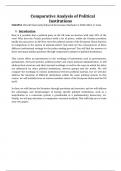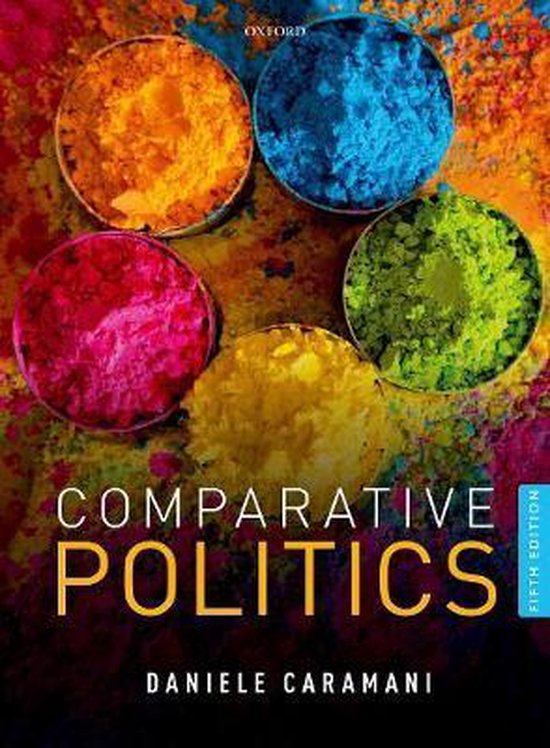Comparative Analysis of Political
Institutions
USG2051 Utrecht University School of Governance Bachelor 2, 2020-2021, 2 term nd
1. Introduction
How is it possible that a political party in the UK wins an election with only 35% of the
vote? Why does the French president wield a lot of power, whilst the German president
hardly has any power at all? How does the political system of the European Union function
in comparison to the system of national states? And what are the consequences of these
different institutional settings for the policy-making process? You will find the answers to
these and many similar questions through comparative analysis of political institutions.
This course offers an introduction to the workings of institutions such as governments,
parliaments, electoral systems, political parties and supra-national administration. It will
address their structure and their internal workings, as well as the ways in which the latter
are influenced by other political institutions, interest groups and the media. We will
compare the workings of various institutions between political systems, but we will also
address the interplay of different institutions within the same political system. In this
course, we will notably focus on various member states of the European Union and the EU
itself.
In class, we will discuss the literature through questions and exercises, and we will address
the advantages and disadvantages of having specific political institutions, such as a
majoritarian or a consensus system, a presidential or a parliamentary democracy, etc.
Finally, we will pay attention to comparative research methods. This will help you to write
your own paper.
, 7. Detailed Programme
Week 47 – Introduction
During the introductory week, we will first deal with practical matters concerning the
course, before turning to a discussion of the substance and the relevance of comparative
politics. Besides providing an overview of the course and its structure, the goal here is to
examine the relationship between political science and public administration. By so
doing, we will see why public administration in most countries is conceived as a
subdiscipline of political science, rather than as a separate discipline.
Lecture
Comparative Analysis of Political Institutions
The Dutch political system exists of many parties, proportional representation,
compromise
A country’s political system structures the ways in which citizens’ preferences (inputs) are
translated into policy (outputs)
Inputs (demands and support) are translated into the political system, which realizes
output (decisions and actions), the public gives feedback
Representative democracy:
- Chain of responsiveness: links citizens’ preferences (input) to results of policy making
(output), democratic process induces the government to implement policies that citizens
want
Varieties of democracy (what is it, types, measure, why more), electoral systems (rules,
referenda), parties (what are they, systems), participation (why, how), interest groups,
media, supra-national constraints (states, role, globalization), EU as new political system
(role, differences with national political systems)
- Chain of accountability: links policies (output) to citizens’ preferences (input), voters can
respond with sanctions if policies don’t correspond with their preferences
Preparation
Read for the seminar:
▫ Course manual
▫ Caramani (2017/2020) Introduction to comparative politics
Comparative politics is discipline of political science. It explains differences between political
systems.
Introduction
Politics is the human activity of (acquiring the power of) making public and authoritative
decisions. It’s important who decides what and how.
What is comparative politics?
A science of politics
Political theory deals with theoretical, comparative politics with empirical questions
International relations deals with interactions between, comparative politics within systems, so
,when there is a constituency and sovereignty
Types of comparative politics
Study of single countries (comparative perspective), methodological tradition (enhancing
standards of comparison), analytical tradition (explanations of differences between countries)
Substance (study of political institutions) and method (explaining differences following
standards)
Comparative politics describe, explain and predict differences
The substance of comparative politics
What is compared?
Sub-national regional or supranational systems, types of political systems, single elements
From institutions to functions
First formal analyses of state institutions, then behavioral revolution, and analyses of politics in
practice, less focus on the West, new concepts required, not only Anglo-Saxon democracies were
viable, and alternative practices of politics, variety of political systems, role of agencies, new
methodology, systemic functional language
And back to institutions
Too remote framework, so a shift of substantial focus to the state institutions, a narrowing of
geographical scope and less global comparison, a change of methodology to case-oriented
analyses, and a theoretical turn to the rationality and strategies of actors
What is left?
Variety of features of the political system
Contribution by the paradigm: political system as a set of structures whose decision-making
function is to reach the allocation of values receiving support and demands which it shapes
through the feedback loop
Scope is still growing, focus on output processes, international relations, globalization etc.
The method of comparative politics
A variety of methods
Methods are different because of different numbers of cases, type of data and time period,
depending on the research question
The dimensions of comparison can be diverse, spatial, functional or longitudinal
Units of analyses can be diverse
Research can focus on similarities or differences
From cases to variables
First small-N research designs concentrated on the Anglo-Saxon model of democracy, then
behavioral revolution, larger data sets, quantities as general language/indicators, sophisticated
techniques, extensive research designs (many cases, few variables)
And back to cases
Return to small-N case oriented qualitative research, explanation of combined factors in one case
possible, no longer variable oriented
, From aggregate to individual data
First statistics on nation-states and welfare states to get knowledge of society, aggregate data are
available at a territorial level
Then behavioral revolution, official statistics may be subject to manipulation so new data sets,
and don’t include all interesting variables like political actors and individuals values and opinions
so surveys, larger data sets with individuals so electronation, proof that statistics can’t be
generalized for individuals, so more individual data necessary
And back to aggregate data
Creation of international networks, much aggregate data, because it’s difficult to build long time
series with individual data, aggregate data necessary for a long-term perspective
Conclusion
The variety of comparative politics
Various approaches, methods and data, because everything is comparable
The development of mass democracies is the greatest change
From divergence to convergence
Divergence from Western democracies to alternative models of political order, that led to
comparative politics, but now the world is less diverse because of globalization, focus on
differences and similarities, and cases aren’t always independent, open systems, governance, and
policy learning
And back to divergence
Religion, populism, referenda, so no linear developments
▫ Caramani (2017/2020) Chapter 1 (The relevance of comparative politics)
Informing the public debate and giving policy advice
Underdeveloped potential for being relevant
Good political institutions like democratization impact wellbeing and trust
What should comparative politics be relevant for?
For what is it relevant?
Informing the public debate, advising about public policies, increasing social justice and
wellbeing
Political institutions and human wellbeing
Political institutions are now understood to have impact on wellbeing
The institutional turn and comparative politics
Institutions are the rules of the game, and impact wellbeing
Not only structural variables explain why societies are successful in providing wellbeing
Comparative politics are relevant because it specifies which political institutions increase
wellbeing and how such institutions can come about






